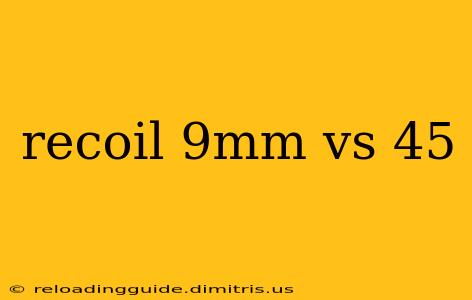Choosing between a 9mm and a .45 ACP handgun often comes down to personal preference, but understanding the recoil characteristics of each caliber is crucial for safe and effective shooting. This in-depth comparison will explore the nuances of recoil in both calibers, helping you make an informed decision.
Understanding Recoil: More Than Just a "Kick"
Recoil isn't simply a "kick" you feel; it's a complex interplay of physics, encompassing the firearm's weight, the cartridge's characteristics, and the shooter's grip and posture. While .45 ACP is generally perceived as having more recoil than 9mm, the reality is more nuanced.
Factors Influencing Perceived Recoil:
-
Bullet Weight and Velocity: .45 ACP rounds typically have heavier bullets than 9mm, but often with lower velocities. This contributes to a different recoil impulse—a sharper, more noticeable jolt in the case of .45 ACP, versus a snappier recoil in 9mm.
-
Gun Weight: A heavier handgun will absorb more recoil energy, making it feel less intense. A lightweight .45 ACP will have more noticeable recoil than a heavier one, and the same principle applies to 9mm handguns.
-
Grip and Stance: Proper shooting technique significantly impacts felt recoil. A firm, consistent grip and a balanced stance help mitigate the effects of recoil, regardless of caliber.
-
Individual Sensitivity: Personal factors such as body size, strength, and shooting experience influence how strongly recoil is felt.
Recoil Comparison: 9mm vs .45 ACP
While a direct numerical comparison is difficult due to the variables mentioned above, we can offer a general comparison:
9mm:
- Generally Less Recoil: The lighter bullet and higher velocity of 9mm typically result in less felt recoil than .45 ACP.
- Snappier Recoil: The recoil is often described as sharper and quicker, making follow-up shots potentially easier for some shooters.
- Better for Smaller Shooters: The reduced recoil makes 9mm a more manageable option for individuals with less upper body strength.
- Higher Capacity Magazines: 9mm handguns usually offer higher magazine capacities than .45 ACP, providing more rounds per magazine.
.45 ACP:
- Generally More Recoil: The heavier bullet and lower velocity generally result in a more substantial recoil impulse.
- Heavier Recoil: The recoil is often described as heavier and slower, potentially impacting follow-up shot speed for some.
- More Stopping Power (Debated): While often touted for its stopping power, the effectiveness of .45 ACP compared to 9mm in real-world scenarios is a subject of ongoing debate amongst experts. The difference in stopping power is often marginal and dependent on shot placement.
- Lower Capacity Magazines: .45 ACP handguns typically hold fewer rounds per magazine than their 9mm counterparts.
Choosing the Right Caliber for You
The "better" caliber depends entirely on the individual and their intended use.
Consider these factors:
- Shooting Experience: Beginners might find 9mm easier to control due to less recoil.
- Physical Strength: Individuals with less upper body strength might prefer the lighter recoil of 9mm.
- Intended Use: Self-defense, target shooting, or hunting will influence the choice.
- Personal Preference: Ultimately, the best way to determine your preference is to try both calibers at a shooting range.
Conclusion: It's About the Whole Package
The choice between 9mm and .45 ACP isn't just about recoil; it's about the entire shooting experience. Consider the factors discussed above—recoil characteristics, handgun weight, magazine capacity, and personal preference—to make the best decision for your needs and shooting style. Don't hesitate to seek advice from experienced shooters and firearms instructors to further refine your understanding.

